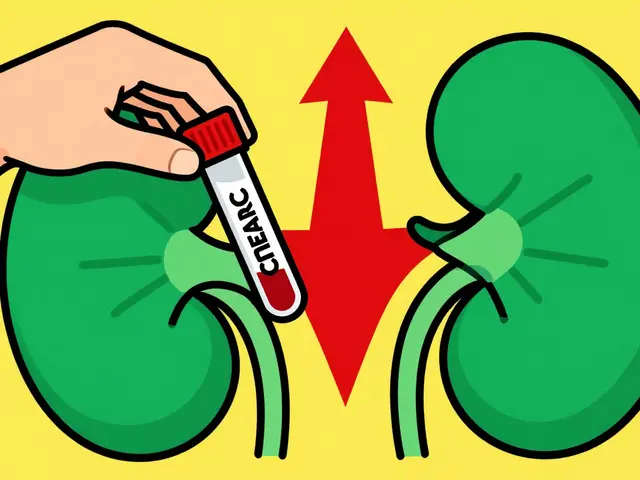Introduction to Trimethoprim and Sun Exposure
As someone who enjoys spending time outdoors, I always make sure to take precautions when it comes to sun exposure. That's why I was surprised to learn that certain medications, like the antibiotic trimethoprim, can actually increase your sensitivity to the sun. In this article, I will discuss everything you need to know about trimethoprim and sun exposure, from the reasons behind this increased sensitivity to the best ways to protect yourself.
Understanding Trimethoprim and Its Uses
Before we dive into the relationship between trimethoprim and sun exposure, it's important to understand what trimethoprim is and why it might be prescribed to you. Trimethoprim is an antibiotic that is commonly used to treat bacterial infections, such as urinary tract infections (UTIs), respiratory infections, and ear infections. It works by inhibiting the growth of bacteria, allowing your immune system to effectively fight off the infection.
Trimethoprim is often prescribed in combination with another antibiotic called sulfamethoxazole. Together, these two medications form a powerful antibiotic known as co-trimoxazole or Bactrim. This combination is particularly effective against a wide range of bacteria, making it a popular choice for treating various infections.
Increased Sun Sensitivity: The Link Between Trimethoprim and Sun Exposure
Now that we know what trimethoprim is and what it's used for, let's discuss the connection between this medication and sun exposure. Trimethoprim, especially when combined with sulfamethoxazole, can cause increased sensitivity to the sun. This is because these antibiotics can make your skin more susceptible to the harmful effects of ultraviolet (UV) radiation.
This increased sun sensitivity, also known as photosensitivity, can result in a higher risk of sunburn and skin damage, even after just a short amount of time in the sun. In some cases, people taking trimethoprim may also develop a rash or experience increased skin redness when exposed to sunlight.
Protecting Your Skin: Tips for Staying Safe in the Sun While Taking Trimethoprim
If you're taking trimethoprim, it's crucial to take extra precautions to protect your skin from the sun. Here are some tips for staying safe while enjoying the outdoors:
- Wear sunscreen: Apply a broad-spectrum sunscreen with an SPF of at least 30 to all exposed skin, and make sure to reapply every two hours, or after swimming or sweating.
- Seek shade: Whenever possible, seek shade during peak sun hours (usually between 10 a.m. and 4 p.m.). This can help minimize your exposure to harmful UV rays.
- Wear protective clothing: Long sleeves, pants, and wide-brimmed hats can provide additional protection from the sun. Look for clothing with a UPF (ultraviolet protection factor) rating for added sun protection.
- Wear sunglasses: Protect your eyes from UV rays by wearing sunglasses that block 100% of UVA and UVB radiation.
- Stay hydrated: Sun exposure can be dehydrating, so make sure to drink plenty of water throughout the day to stay hydrated and help your body regulate its temperature.
- Be cautious with tanning: While it might be tempting to get a tan, it's important to remember that tanning can increase your risk of skin damage and skin cancer. Opt for self-tanning products instead of tanning beds or sunbathing.
When to Talk to Your Doctor About Trimethoprim and Sun Exposure
If you're taking trimethoprim and are concerned about sun exposure, it's important to discuss your concerns with your healthcare provider. They can help you determine the best course of action for protecting your skin and may be able to recommend alternative medications if needed. It's also crucial to contact your doctor if you experience any severe sunburn, rash, or other skin reactions while taking trimethoprim, as these could be signs of an adverse reaction to the medication.
Conclusion: Staying Safe in the Sun While Taking Trimethoprim
In conclusion, it's essential to be aware of the increased sun sensitivity that can occur when taking trimethoprim. By following the tips provided in this article and discussing any concerns with your healthcare provider, you can help protect your skin from the harmful effects of the sun while still enjoying your time outdoors. Remember, it's always better to be safe than sorry when it comes to sun exposure and the health of your skin.






Abigail M. Bautista
June 19, 2023 AT 19:41I took this once for a UTI and got burned through my shirt like it was tissue paper
no joke I looked like a lobster after two hours at the park
Rohan Puri
June 19, 2023 AT 23:43nah man you just weak
my cousin took it in Goa and surfed all day
no sunscreen no hat no problem
your skin just needs to toughen up
Chris Bellante
June 21, 2023 AT 16:33Photosensitization mediated by CYP450 inhibition of retinoid metabolism
mechanism is well documented in JAMA Dermatology 2019
don't be a statistic
Nicole Manlapaz
June 22, 2023 AT 02:08Yessss this is so important!!
I'm a nurse and I see people get wrecked by this all the time
sunscreen SPF 50+ every 2 hours no exceptions
and wear a hat even if you think you're 'not that fair'
you're not invincible 😘
Frederick Staal
June 23, 2023 AT 14:01This article is dangerously naive. You're normalizing pharmaceutical negligence by implying this is just a "minor" side effect.
Trimethoprim is a Class I photosensitizer under FDA guidelines
and yet doctors prescribe it like it's aspirin
while patients suffer third-degree burns and long-term pigmentation damage
this isn't about sunscreen-it's about systemic medical malpractice
erin orina
June 23, 2023 AT 20:37I love that you included hydration!! 💧
Also sunglasses are non-negotiable-my eyes felt like they were on fire after my first day on this med
you're not just protecting skin, you're protecting your whole body
you got this, stay safe and glow responsibly 🌞💖
Lisa Uhlyarik
June 25, 2023 AT 11:51You're just reinforcing the capitalist medical-industrial complex by telling people to buy sunscreen
what about radical self-reliance?
why not just avoid antibiotics entirely and eat turmeric and crystals
sun exposure is a spiritual cleanse anyway
your skin knows what to do if you stop listening to doctors
Kelley Akers
June 26, 2023 AT 00:49Honestly if you're taking antibiotics and still going to the beach you're just asking for trouble
you clearly don't understand the gravity of microbial resistance
and now you're risking melanoma too?
how is this even a conversation?
Mandeep Singh
June 26, 2023 AT 08:14This is why Western medicine is broken
we take pills like candy and then complain when our skin burns
in India we use neem and turmeric for infections
and we don't need SPF 50 to walk outside